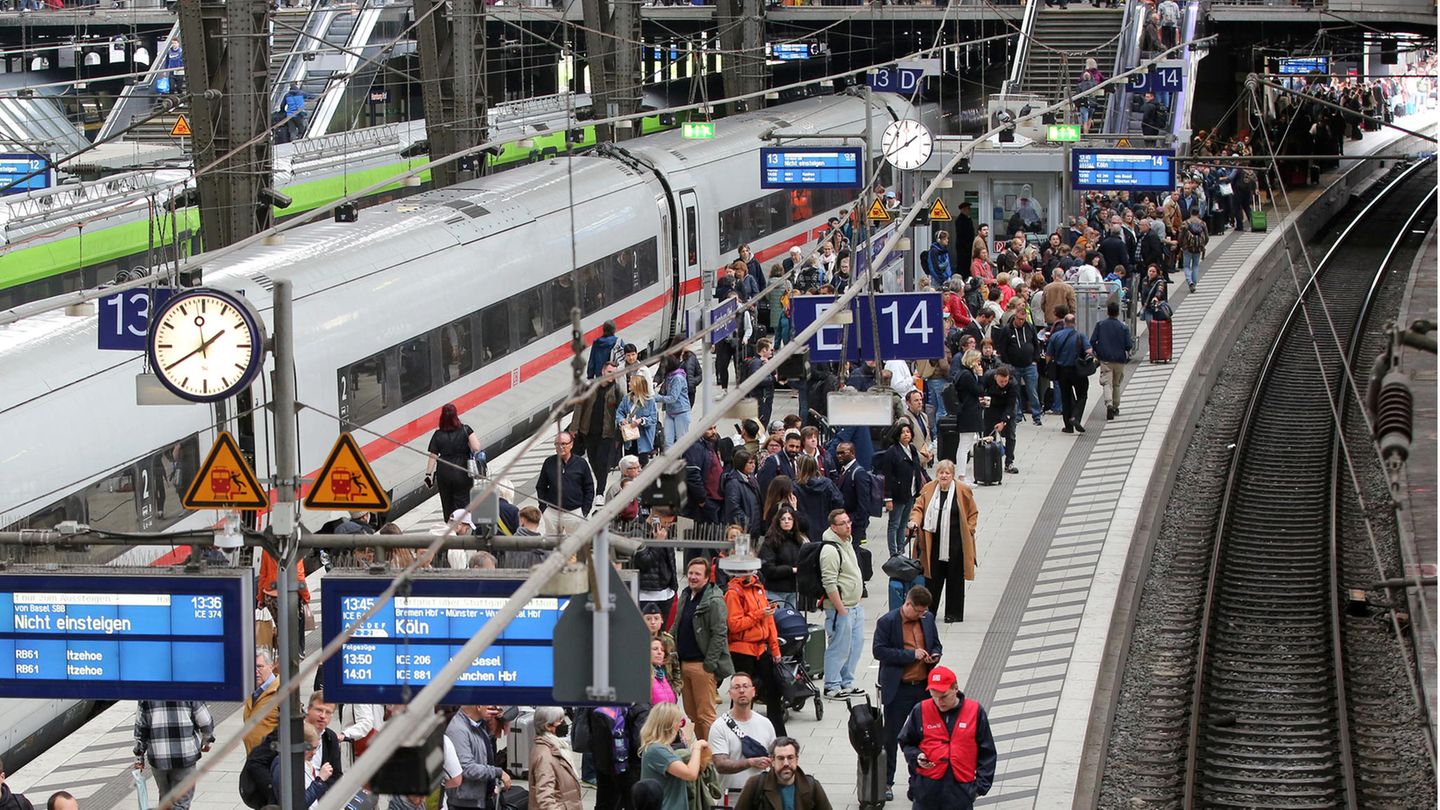The planned 50-hour warning strike was averted, but not all train drivers benefit from it. Deutsche Bahn trains will only run to a limited extent on Monday. Normal operation should not prevail until Tuesday.
After the cancellation of the two-day warning strike, Deutsche Bahn was still unable to let the trains run as usual at the beginning of the week. On Monday, a third of the planned long-distance trains will not operate, the state-owned group announced on Sunday. “From Tuesday, all ICE and IC trains will be back on the road as planned,” Deutsche Bahn announced.
The reason for the limited offer on Monday was the difficult organization: Around 50,000 long-distance and local train journeys would have to be rescheduled with the corresponding shift and deployment plans. Some of the wagons and locomotives would have to be brought to new departure points.
For regional traffic, the railways generally spoke of “restrictions and cancellations”, which can be expected regionally on Monday. The railways were already expecting individual train cancellations for Sunday evening. The warning strike called by the railway and transport union (EVG) was to begin at 10 p.m. on Sunday and end 50 hours later, at midnight on Tuesday.
The EVG surprisingly canceled the planned strike on Saturday. Previously, there had been an agreement in the collective bargaining dispute with the railways mediated by the Frankfurt am Main Labor Court, which will now form the basis of further collective bargaining.
Since the warning strike was only canceled at Deutsche Bahn, some connections from other railway companies will be canceled at the beginning of the week. In Bavaria, for example, the Bavarian Oberlandbahn, the Bavarian Regiobahn and the Meridian are affected, as the EVG announced. The union is currently negotiating new collective agreements with dozens of railway companies.
“DB’s appeal to the labor court was worth it for everyone”
The warning strike announced on Thursday morning brought plenty of movement into the talks between EVG and DB. Deutsche Bahn tried aggressively to prevent the walkout. However, an attempt to negotiate failed on Thursday evening, and on Friday afternoon an ultimatum from the EVG for a new offer from DB expired.
In the next step, the group went before the labor court in Frankfurt am Main and filed an urgent application to avert the warning strike with an injunction to cease and desist. The DB rated the planned walkout as “disproportionate”, it harmed customers and “uninvolved third parties”. Discussions took place in court on Saturday for almost four hours before both sides agreed to a settlement – i.e. a compromise.
“The way Deutsche Bahn went to the labor court was worth it for everyone,” said DB HR Director Martin Seiler, according to the announcement. With the settlement, both sides also agreed, according to the DB, “to negotiate quickly and constructively, with the aim of an early conclusion”.
A sticking point in the ongoing collective bargaining conflict is the issue of the minimum wage, which, according to both sides, also took up a lot of space in court. Around 2,000 employees currently only receive the statutory minimum wage of 12 euros through allowances. The EVG has made it a prerequisite for all further negotiations that this minimum wage is first included in the tariff tables. She wants to ensure that these 12 euros per hour form the basis for all further negotiation results.
Initially, Deutsche Bahn did not want to meet any preconditions before the actual negotiations. In the meantime, however, she has agreed to include the minimum wage in the tariff tables in advance. Most recently, there was still a dispute as to whether future negotiation results should also be written one-to-one for the lowest wage groups in the tables or paid out differently, for example in the form of bonuses.
Demands for more wages at Deutsche Bahn
The collective bargaining round affects 230,000 employees, 180,000 of whom work for Deutsche Bahn. The dispute over the minimum wage affects just around one percent of the people for whom negotiations are taking place overall. For the union, however, this point is crucial – they want to strengthen employees with low wages disproportionately with a view to inflation.
The fact that the lower wage groups are to be strengthened disproportionately is also shown by the main demand made of the industry, which focuses on a high fixed amount: the union wants to achieve 650 euros more per month for employees at the 50 railway companies, only at the She asks for percentages on top incomes, specifically 12 percent. According to the union, the term should be 12 months.
The railway recently announced tax- and duty-free one-off payments totaling 2,850 euros and gradual increases of 10 percent for the lower and middle income groups and 8 percent for the upper income groups – all of this over a period of 27 months.
Source: Stern




